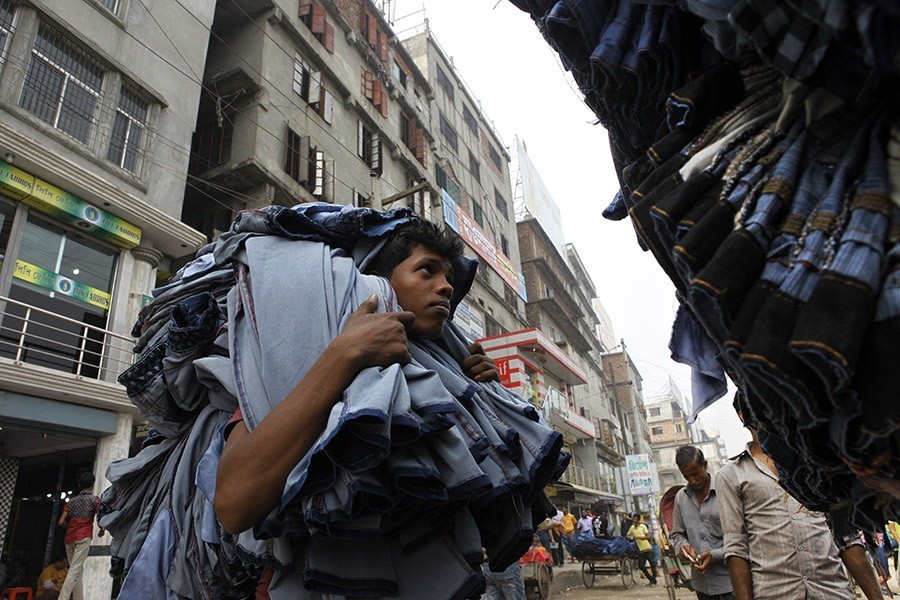Bangladesh's jobless workers of apparel, leather sectors to get handouts

Published :
Updated :

The government has drafted guidelines for implementing a social safety net programme for the workers of export-oriented readymade garment, leather and footwear sectors who have lost jobs during the pandemic, officials said.
The labour and employment ministry on Wednesday issued a gazette notification in this connection to implement the social safety net programme funded by the European Union and Germany for the export-oriented sectors.
Under the programme, a worker who was employed until February last in an export-oriented RMG or leather goods or footwear factory and is now jobless, due to accident or physical illness, termination or factory lay-off and permanent closure of factory, would be the beneficiary, a ministry official said.

Jobless workers of the two export-oriented sectors under the social safety net programme will get a financial support worth Tk 3,000 for three months, he added.
The worker would be ineligible for the support if he or she gets jobs during this support time, according to the guideline.
An eight-member committee led by the director general of the Department of Labour (DoL) would be formed to implement the programme with active support from the factory owners.
Representatives from Bangladesh Garment Manufacturers and Exporters Association (BGMEA), Bangladesh Knitwear Manufacturers and Exporters Association (BKMEA), Leather Goods and Footwear Manufacturers and Exporters Association of Bangladesh (LFMEAB) and Bangladesh Finished Leather, Leather goods and Footwear Exporters Association (BFLLFEA) would be included in the committee.
Labour rights groups, however, opposed the committee and demanded inclusion of workers' representatives to the committee to define the beneficiaries correctly.
The workers who worked in the active member factories of BGMEA, BKMEA, LFMEAB and BFLLFEA would be entitled to receive the financial support, according to the guideline.
"Many of the workers of RMG and leather goods and footwear sector in the country were passing their days in severe hardship as exports declined in the EU and North America and factory owners were forced to lay off their units due to the coronavirus pandemic," it reads.
The government with the support from the EU and Germany had initiated the move to provide necessary support to the workers of the export sectors, it said.
The respective factories would preparer the primary list of jobless workers and the trade bodies would scrutinise the list and would send to the DoL.
The DoL would finalise the beneficiary list according to the recommendation from the evaluation committee.
The beneficiaries would receive the amount through bank accounts or mobile accounts without any charge.
Expressing grave concern, Industrial Bangladesh Council on October 04 in a letter to state minister for labour said these policies have been formulated without any consultation with the IBC which genuinely represents the workers, especially those who are employed in the RMG sector.
"We have serious concern over the way it was decided to make the list of the workers and we fear that the real jobless workers will be deprived of the benefit," the IBC letter reads.
In mid-April, the EU announced the mobilisation of a fund worth over 334 million euros in the fight against COVID-19 and its impact on Bangladesh.
Of the 334 million euros, 113 million euros will help the government provide cash assistance to workers in the export-oriented industries adversely affected by the economic fallout of the pandemic, the EU had said in a statement.
However, it took more than five months for the government agencies concerned to determine the modalities of the safety net programme, sources said. The foot-dragging, thus, has deprived the poor workers of the support they needed during the most difficult time.
There is no specific data on retrenched or jobless workers during the pandemic.
Official data from the Industrial Police revealed that at least 22,400 RMG workers were fired until July 20 while the labour ministry data said some 20,000 RMG workers lost jobs.
On the other hand, BGMEA president Dr Rubana Huq at a recent virtual event said it has a list of 106 factories, which retrenched a total of 70,000 workers during the pandemic.
Center for Global Workers' Rights (CGWR), in a report in March, said more than one million garment workers in Bangladesh were fired or furloughed (temporarily suspended from work) as a result of order cancellations and the failure of buyers to pay for these cancellations.
Munni_fe@yahoo.com


 For all latest news, follow The Financial Express Google News channel.
For all latest news, follow The Financial Express Google News channel.